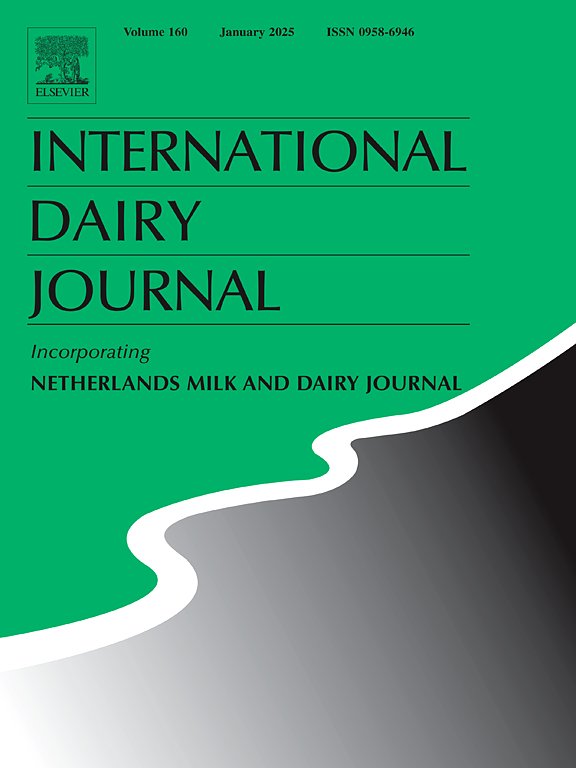Exploring consumer attitudes towards whey's health benefits
IF 3.1
3区 农林科学
Q2 FOOD SCIENCE & TECHNOLOGY
引用次数: 0
Abstract
Whey, a byproduct of cheese production, is rich in nutrients and bioactive components, making it a focal point for both environment-conscious cheese manufacturers and health-conscious consumers. This study investigates consumer attitudes toward health and nutritional claims related to whey, particularly amidst a growing interest in minimally processed options. A questionnaire, distributed to 172 participants, assessed general demographics, lifestyle choices, and attitudes towards whey's health benefits. Participants were categorized into two clusters, Nutritional Enthusiasts (NE) and Nutritional Indifferents (NI) by hierarchical cluster analysis. To discern differences between clusters, a nonparametric comparison (Mann-Whitney U test) was utilized. NE participants, who actively incorporate whey into their diets, demonstrate a strong belief in its health benefits, particularly in immune support, body regeneration and vitality. NI respondents largely express the lack of opinion regarding health claims, reporting the taste of whey unbearable (23.1%). The preference among NE respondents underscores a trend toward goat whey (82.4%). Lack of knowledge egsists regarding whey's sugar content, indicating a need for better consumer education. The findings emphasize the importance of responsible marketing that highlights whey's nutritional advantages while avoiding unfounded health claims. Promoting direct purchases from local producers could promote sustainability of small-scale dairy businesses. This research enhances our understanding of consumer trends in whey consumption, emphasizing opportunities to boost product appeal through innovative, minimally processed options.
探索消费者对乳清健康益处的态度
乳清是奶酪生产的副产品,富含营养和生物活性成分,使其成为具有环保意识的奶酪制造商和注重健康的消费者关注的焦点。本研究调查了消费者对与乳清有关的健康和营养声明的态度,特别是在对最低加工选择的兴趣日益浓厚的情况下。一份调查问卷分发给172名参与者,评估了一般人口统计、生活方式选择和对乳清健康益处的态度。通过层次聚类分析,将参与者分为营养爱好者(NE)和营养冷漠者(NI)两类。为了辨别集群之间的差异,采用了非参数比较(Mann-Whitney U检验)。积极将乳清纳入饮食的NE参与者对其健康益处,特别是在免疫支持,身体再生和活力方面表现出强烈的信念。NI受访者大多对健康声明缺乏意见,报告乳清的味道难以忍受(23.1%)。东北地区受访者的偏好强调了山羊乳清的趋势(82.4%)。缺乏关于乳清含糖量的知识,表明需要更好的消费者教育。研究结果强调了负责任的营销的重要性,强调乳清的营养优势,同时避免毫无根据的健康声明。促进从当地生产者直接采购可以促进小规模乳品企业的可持续性。这项研究增强了我们对乳清消费趋势的理解,强调了通过创新的、最少加工的选择来提高产品吸引力的机会。
本文章由计算机程序翻译,如有差异,请以英文原文为准。
求助全文
约1分钟内获得全文
求助全文
来源期刊

International Dairy Journal
工程技术-食品科技
CiteScore
6.50
自引率
9.70%
发文量
200
审稿时长
49 days
期刊介绍:
The International Dairy Journal publishes significant advancements in dairy science and technology in the form of research articles and critical reviews that are of relevance to the broader international dairy community. Within this scope, research on the science and technology of milk and dairy products and the nutritional and health aspects of dairy foods are included; the journal pays particular attention to applied research and its interface with the dairy industry.
The journal''s coverage includes the following, where directly applicable to dairy science and technology:
• Chemistry and physico-chemical properties of milk constituents
• Microbiology, food safety, enzymology, biotechnology
• Processing and engineering
• Emulsion science, food structure, and texture
• Raw material quality and effect on relevant products
• Flavour and off-flavour development
• Technological functionality and applications of dairy ingredients
• Sensory and consumer sciences
• Nutrition and substantiation of human health implications of milk components or dairy products
International Dairy Journal does not publish papers related to milk production, animal health and other aspects of on-farm milk production unless there is a clear relationship to dairy technology, human health or final product quality.
 求助内容:
求助内容: 应助结果提醒方式:
应助结果提醒方式:


